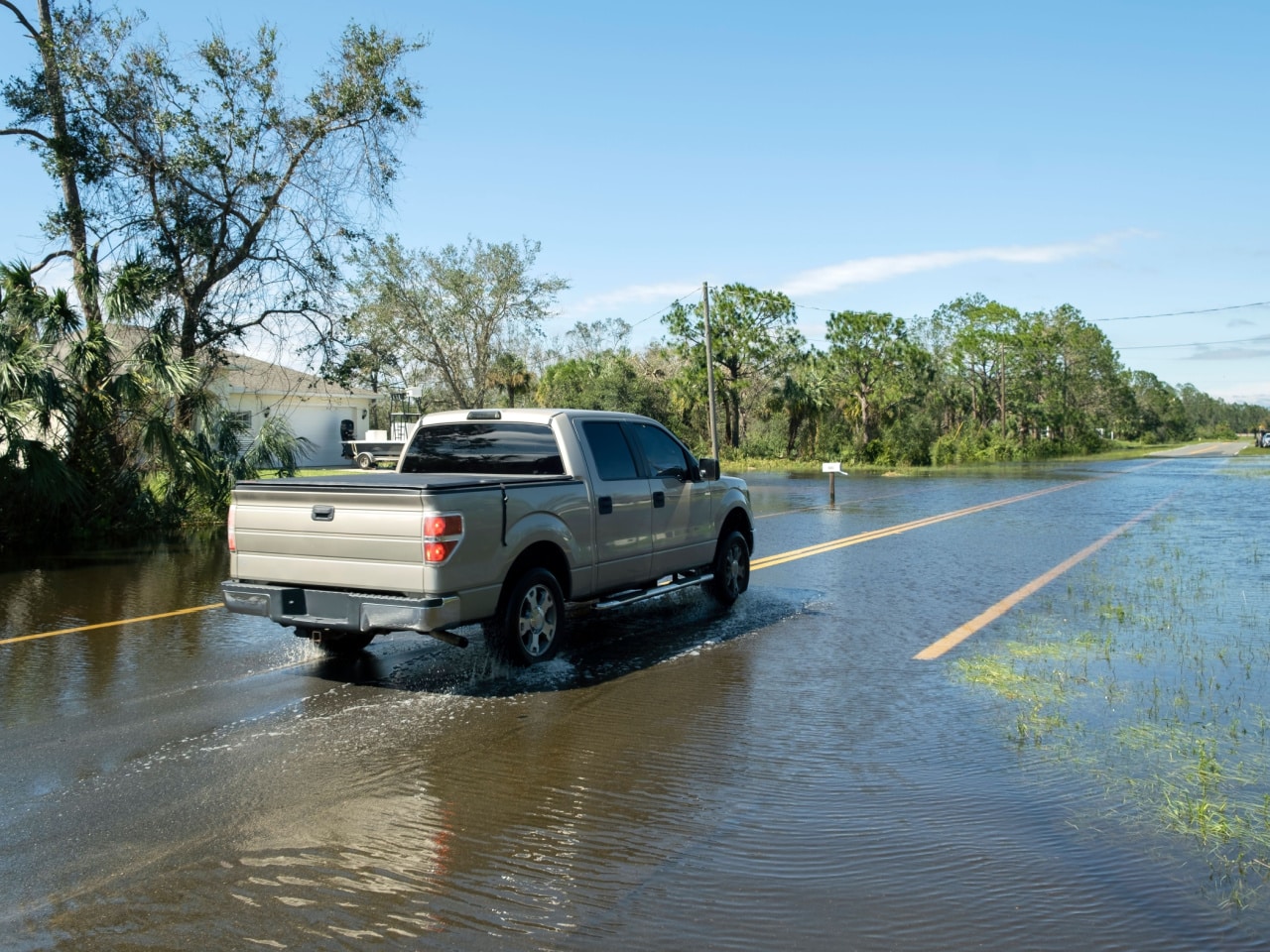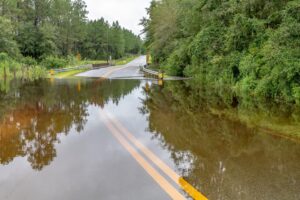
This week’s band of severe weather slammed into Tampa Bay with a vengeance. On Tuesday, high winds, heavy rains, and coastal flooding hit large areas of Florida, causing varying degrees of damage across the state. Locally, we experienced tornado touchdowns in both Hillsborough and Pinellas counties. An EF-1 tornado touched down in the Eagles subdivision and weather experts confirmed an EF-0 near downtown St. Petersburg. Neither caused injuries nor fatalities, thankfully. This intense weather made roads difficult to navigate this week. Commuters struggled, battling heavier-than-usual traffic because of the wind and rain. While not listed as a cause, we know the wet roads likely contributed to a DUI accident that killed one man near Dale Mabry on Tuesday night.
Knowing how weather affects roads is key to protecting yourself from an accident. We’re sharing important information about severe weather on our roads, and tips for driving in a storm.
How does severe weather affect traffic and road safety?
In Florida, we enjoy beautiful weather throughout most of the year. When foul weather hits though, it tends to be bad. With an abundance of water on all sides, and no mountains to serve as a windbreak, serious storms cause our roads to become incredibly dangerous to navigate.
Rain
Central Florida gets plenty of rain each year. It’s true, that many of our roads are designed with water in mind. They are slightly crested in the center with ditches along the sides. This allows water to run off more easily and prevents pooling (and the risk of hydroplaning). Even with these mitigations built in though, water can quickly cause our roads to become slick. When this happens, even minor mistakes like taking a turn too quickly, following too closely, or changing lanes suddenly could be catastrophic.
Flooding

The depth of water can be deceptive! It’s better to be safe than sorry.
As mentioned above, the state of Florida is surrounded by water. In addition, our water table sits high, and we have plentiful lakes and waterways across each county. Because of this, heavy rains can cause severe flooding in a very short amount of time. Flooding covers roads and intersections quickly. This makes traveling nearly impossible. If you see water standing in the road, it’s better to be safe than sorry. Water can be deceiving and is frequently much deeper than it appears. If you risk it and get stuck, you could end up in a serious situation.
Wind
Hillsborough County has very little to break the wind coming in off the coast. When storm systems come our way, those winds pick up fast, and they hit hard. High winds are dangerous as they impact vehicles as they travel at high speeds and can, essentially, blow you into another lane or off the road. What’s more, high winds take down tree branches, power lines, and more. This damage can make roads impassable.
Debris
Thanks to the flooding and high winds, serious storms often leave debris in and around our local roads. When debris is left on streets and highways, motorists can end up crashing when they come up on it too quickly and swerve to avoid it. Accidents also happen when debris is struck and causes a car to flip or swerve, or sends the vehicle into the path of another car.
Tampa residents take bad weather seriously, and for good reason. You don’t have to live in fear of a storm though. Our team has worked together to find helpful tips for driving in a storm and we’re sharing them with you!
Protect yourself with these tips for driving in a storm.
Driving in bad weather is never fun. One of the best ways to proactively protect yourself is by keeping up with car maintenance. Tires, brakes, wipers, and headlights are all important features that keep you safe if you’re driving in poor conditions. There are other things you can do if you end up in severe weather while on the road though. When behind the wheel and facing stormclouds, remember:
- Slow down!
- Maintain visibility by using your wipers at the appropriate speed
- Pull over if you lose visibility at any time. Try to find an exit, but if you have to park on the road, get as far off the shoulder as safely possible.
- Stay calm. If you panic, you’re more likely to make dangerous mistakes behind the wheel.
- Turn on your lights! Oftentimes during the day, automatic lights won’t turn on and must be done manually.
- Keep weather reports at a low volume. Knowing about any alerts like tornado warnings or flood watches is important so you can seek shelter ASAP.
Will the weather be blamed for my accident?
Car accidents are a common side effect of severe weather. This does not mean, however, that bad weather is automatically assumed to be the cause of every collision that happens during a storm. In the fatality that happened on Tuesday night, the driver was heavily intoxicated and was speeding when his car lost control and struck a pedestrian. Could wet roads have caused him to slide more easily? Yes, perhaps. But, driving under the influence and speeding were more impactful on this accident than the weather.
Don’t automatically assume that your accident will be written off as “weather-related” if your collision happened during a storm. If the other driver was distracted, under the influence of alcohol or controlled substances, or was speeding, they are still going to be held accountable for their negligence.
If you’ve been injured in an accident, regardless of weather, you need to call your local accident attorney for guidance.
Tampa accident victims trust Brooks Law Group.
This past Tuesday’s severe weather won’t be the last we see this year. Hurricane Season 2024 is around the corner, and our frequent summer storms will happen like clockwork. When rain and wind come, accidents will follow. Keep the above tips for driving in a storm in mind when bad weather heads our way. Brooks Law Group is here for Tampa accident victims. If you’ve been hurt because of another driver’s negligence or recklessness behind the wheel, we fight for the justice and compensation you deserve.
Our experienced team of accident lawyers walks alongside you during your journey toward a settlement, providing support and guidance throughout. We care about our clients, and you can trust us to treat you like a person, not just another number. When you trust us with your case, you don’t have to worry about the stress of affording legal help. Our contingency fee means you don’t pay unless we win.
Contact us to schedule your free consultation. Rain or shine, you can always Look to Brooks.













